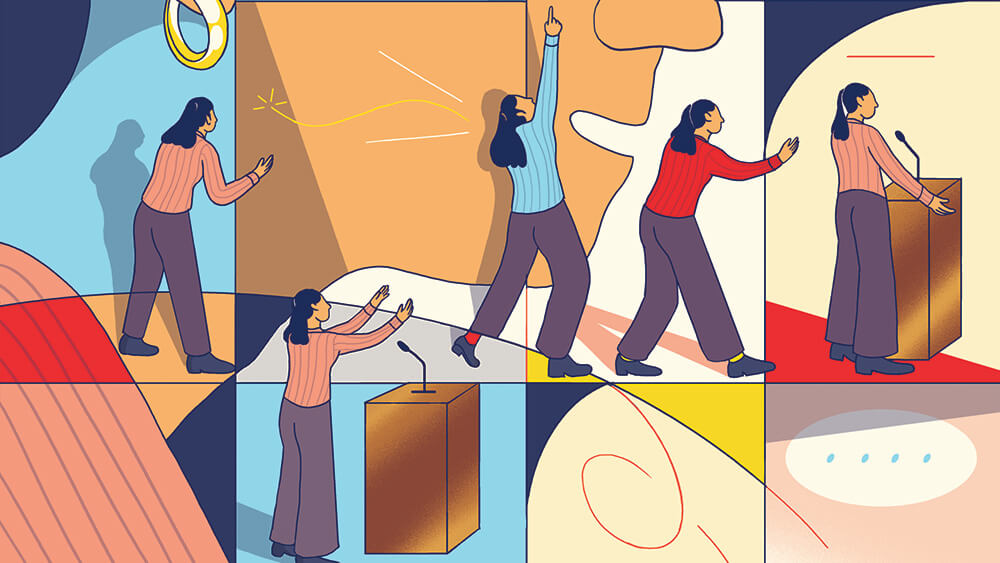When Courtney Mesmer, CMP, DES, CES, became vice president, events, at the human resources organization WorldatWork®Total Rewards Association two years ago, her primary assignment was to modernize the organization’s annual meeting. At the time, the meeting — now called Total Rewards, which refers to the HR function that handles compensation, benefits, well-being effectiveness, development, and recognition — had a typical agenda for a traditional association meeting. In other words, three-hour plenary sessions, combined with breakout sessions that ranged in length from 60 to 75 minutes — and the content team, Mesmer said, was pushing to make the individual sessions even longer. Nearly all the conference presentations came directly from the association’s call for proposals, Mesmer said during a presentation she made at PCMA’s Convening Leaders 2024 in January. “There were a lot of manels.”
Fast forward to WorldatWork Total Rewards ’24, which will be held in May at Duke Energy Center in Cincinnati. Participants will choose from sessions ranging from short, concentrated talks designed to teach specific skills, to debates, roundtables, and hands-on workshops, which, at 75 minutes, are the longest sessions on the schedule. Mesmer has added new voices to the list of speakers, including young professionals who are on the rise in the industry. And instead of an agenda where everyone follows the same schedule, including breaks, participants can follow tracks personalized to match their interests, objectives, and where they are in their careers. It’s a sweeping transformation, and one that relied heavily on the association’s investment in something that often doesn’t get a lot of attention: speaker coaching.
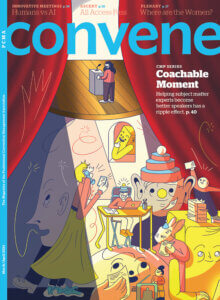
This story is part of the March/April Convene cover and CMP Series on speaker coaching. (Dalbert B. Vilarino illustration)
The speaker’s role at business events has evolved, Mesmer said in January. “People don’t want [to hear from] a sage on the stage anymore. They don’t want people droning on and adding a million PowerPoint slides.” And in the post-pandemic era, “people aren’t going to sit still for something that they can hear on Zoom” at an in-person event. What participants do want is to encounter industry experts who have successfully wrestled with the same problems they face, Mesmer said during the Convening Leaders session, “Coaching Industry Speakers to Deliver Exceptional Learning Experiences,” which she co-presented with Sarah Michel, CSP, vice president of professional connexity for Velvet Chainsaw Consulting.
And although industry experts rank high on the list of the type of speaker that conference participants want to hear from, many people who fit that profile never receive any in-depth training about how to engage audiences, Mesmer told Convene. “If you think of the really great speakers that you’ve experienced, nine times out of 10, they’ve had some sort of speaker coaching.”
While the educational programming is 70 percent of an attendee’s experience at a conference, Mesmer has found that it “probably gets the least amount of attention from planners. You really need to reverse that because, if you are banking on people sitting in your seats [in education sessions], you can’t just leave their experience to chance.”
As she worked to redesign the conference, Mesmer said she thought often about something the actress Lauren Bacall once said: “Standing still is the fastest way of moving backwards in a rapidly changing world.” She started from there, asking herself who was in the best position to get that message across to conference participants and help guide them forward. For Mesmer, it was industry experts at the forefront of change, who are finding solutions to the same problems that conference participants face.
Soon after she arrived at WorldatWork, Mesmer hired Michel to help her create a speaker coaching program for the association. Mesmer’s strategy was to find the experts within the human resources industry who could best address conference participants’ challenges, whether it was through the association’s call for speakers or through curation. Then, with Michel’s help, they would use coaching to turn them into skilled presenters who could equip conference participants with the ability to apply new approaches to their own work.
“Information is at the fingertips of your attendees 24/7,” Michel said during the Convening Leaders presentation. “People aren’t coming to a conference like Total Rewards to get more content. They’re coming to make sense of the content that they are drowning in.” What we tell presenters, Mesmer said, “is that we want them to be guides, sense-makers, and facilitators of learning.”
Setting a High Bar
Among the many changes Mesmer made was revamping the association’s call for speakers — which, in a real sense, is where WorldatWork’s speaker coaching begins. Applicants who propose a session are asked to describe the specific problem that they are solving, and then to choose from a list of eight different session formats, including roundtables, workshops, 25-minute “TED-style” talks, debates, interviews, interactive panels, short sessions focused on building a particular skill, and 45-minute presentations.
Each session is described in the context of the purpose it is best suited for and sets expectations about how audience participants will interact with presenters and with their peers. For example, the list of formats sets a high bar for how and when the “classic” 45-minute presentation should be used. It’s appropriate only for “complex concepts or epic tales of discovery,” and should be accompanied by a 15-minute — at a minimum — Q&A session.
Applicants can suggest the format or formats that they think would best fit their content, but WorldatWork reserves the final say on the session type, Mesmer said. “A lot of times, when people submit for the call, they submit a 45-minute presentation” because that’s what’s been standard. “But they don’t have enough content for a 45-minute presentation. It should be a 20-minute session.”
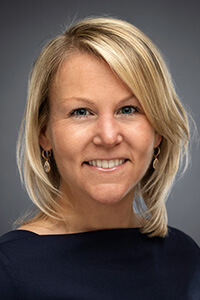
Courtney Mesmer
WorldatWork’s process isn’t so rigid that it filters out those high-powered prospective speakers who don’t want to — or who are too busy to — fill out the form, which runs 12 pages long. Applicants can just send in their idea for a session, Michel said, and, if it seems like a good fit, WorldatWork will come back with a plan for how it could look.
The coaching is a mix of webinars, developed by Michel, and augmented with Zoom Office Hours, tip sheets, and one-on-one coaching calls. As the program has grown, the coaching initiative has added new tools, including a speaker resources portal. One of the primary messages that Mesmer gives presenters during the webinars, which draw as many as 400 participants, is: “You are the bread and butter— the main event — of our show. We already know that you’re a rock star. We just want to make you a better rock star.”
During webinars with titles like “How to Be the Session that Everyone Can’t Stop Talking About,” Michel helps presenters to reverse-engineer their content, pushing them to define what they want participants to be thinking, feeling, and doing as they walk out of the session and then building presentations around those things. “A lot of people don’t start with the end in mind,” Mesmer said. During and after the webinar, “presenters reach out to us with really great ideas” to engage participants, she said. “They ask, ‘Can we launch t-shirts out into the room?’ Or ‘Can we set up the room this way?’”
Michel also uses the webinars to educate presenters on the basics of evidence-based learning, including how adult brains work and how interaction helps people retain knowledge, compared with passively receiving information in a one-way communication stream. “There’s so much science on what happens when an expert shares content on the stage, and then audience participants talk about it with their peers,” Michel said. It “gets baked into the [brain’s] frontal lobe and executive functioning, where it’s retained and where we can go back and share it. It’s like a giant sticky note for the brain.”
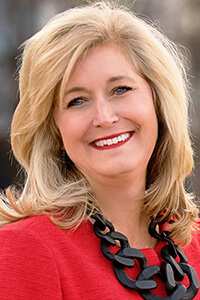
Sarah Michel
Delivering data and information “is usually where we go in concurrent education sessions,” Michel said. “We wanted a learning experience that is facilitated, not presented, where participants are actively involved in thinking and working through challenges together. It is peer-to-peer learning that’s really going to deliver on the networking promise of their conference,” she said. “It is imperative that it’s built in.” The tips offered to speakers are often amix of science and pragmatism, such as the suggestion that speakers could calm their nerves by standing at the door and greeting participants. Michel threw out that tip, she said, not really knowing that if it would click with Total Rewards presenters, many of whom are highly placed executives at companies like Google and Microsoft. “But it worked,” she said, and helped set an interactive tone for the sessions.
Since Mesmer began the speaker coaching program in 2022, there has been a two- fold increase in the number of responses to the association’s call for speakers — up from 200 in 2022 to more than 400 for the 2024 meeting, she said. Mesmer also has increased the proportion of speakers who are curated, compared to those who apply to speak — in 2024, 40 percent were curated. The shift has allowed Mesmer to create the conference agenda, not by filling speaker slots through proposals, but by defining the journey that WorldatWork wants to take participants on — “and then looking for the people who would fill out that narrative,” she said.
This year, attending a “speaker orientation overview,” which is hosted by Michel on Zoom and recorded is written into all speaker contracts. “Even if you’re a senior speaker, there are new things you can learn,” Mesmer said. And “we know who’s in our audience and what the challenges are. We want to coach speakers to help them create the best presentation possible.”
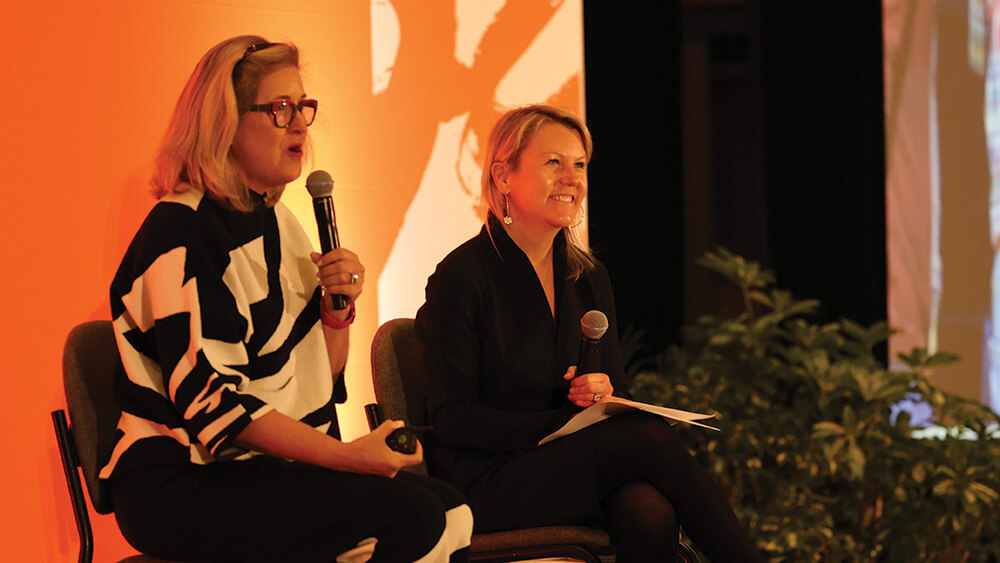
Sarah Michel (left) and Courtney Mesmer co-presented a Convening Leaders 2024 session on coaching industry speakers. (Whatever Media Group)
The Ripple Effect
In 2022, when she started the speaker coaching initiative, Mesmer had felt certain that by improving the education experience, satisfaction with the conference would improve among attendees — and she was right. The approval rating for last year’s conference, which followed the first full year of the speaker coaching initiative, was 98 percent.
But the positive results for the association and its members have gone far beyond the immediate conference experience, Mesmer said. She began hearing from presenters who said that the training they’d received through WorldatWork had helped expand their influence in the organizations they worked for and to develop in their careers, she said. Total Rewards speakers who weren’t already members of the association began joining and referring their friends, she said. Speakers who have had a good experience come back to the conference and bring members of their teams. The more relationships that are built like that, the more likely it is that people will become your advocates and active members of your community, she said.
The speaker coaching program is also helping to build a diverse pipeline of speakers who are early in their careers, she said, including young professionals who may have previously presented only to a few colleagues internally, but are developing enough skills and confidence that they are submitting proposals to speak. “We’re helping them use their voice,” Mesmer added, “and they are going to talk about their great experience and post about it on social media.”
And, from a personal standpoint, Mesmer’s own influence has grown. Her team has grown by two people since 2023, including a speaker concierge. The strategy of investing in the ability of subject matter experts to communicate and present their ideas is now seen as a key member benefit at WorldatWork, and the program — the “speaker engagement initiative” — is part of the overall strategic plan of the organization, Mesmer said.
“It’s been a lot of work,” Mesmer said at Convening Leaders. “It has been challenging at times, but my mantra is,.‘Sometimes the only way out is through.’ Sometimes you have to put in the work to show the results and get what you want.”
Barbara Palmer is deputy editor of Convene.

More From the Series
Earn one clock hour of CMP certification by visiting Convene’s CMP Series page to answer questions about this article, those listed below, and the Freeman Trends Report “2024 Attendee Intent and Behavior,” available for download.
- 4 Ways to DIY a Speaker Coaching Program
- Attendees Want Less Flash, More Substance
- ‘Programming Stellar Content That Connects With an Audience’
- From Skeptic to Sought-After TEDx Speaker Coach
- 4 Mistakes to Avoid When Speaking at Events
The Certified Meeting Professional (CMP) is a registered trademark of the Events Industry Council.

